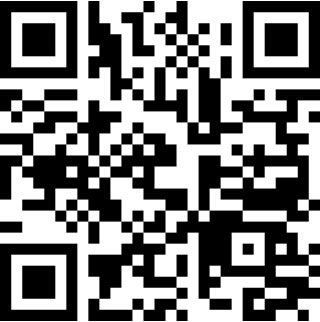B-hCCN2 mice plus
| Strain Name |
C57BL/6N-Ccn2tm3(CCN2)Bcgen/Bcgen |
Common Name | B-hCCN2 mice plus |
| Background | C57BL/6N | Catalog number | 113148 |
|
Aliases |
CTGF, HCS24, IBP-8, IGFBP8, NOV2 | ||
|
NCBI Gene ID |
1490 | ||
- CCN proteins, which can be activated by different stimuli in various cells, have the ability to directly interact with cell surface integrins, growth factors, cytokines and other ECM proteins. These interactions are significantly involved in a range of biological responses. Ultimately, these responses trigger the growth and senescence of myofibroblasts that lead to matrix remodeling.
- The exons 1-5 of mouse Ccn2 gene that encode the whole molecule (ATG to STOP codon), including 3’UTR were replaced by human counterparts in B-hCCN2 mice plus. The promoter and 5’UTR region of the mouse gene were replaced by human counterparts.
- CCN2 was detected in lung, kidney and cortex of wild-type mice, homozygous B-hCCN2 mice and B-hCCN2 mice plus, as the antibody is cross-recognize both human and mouse CCN2.
- Human CCN2 in serum was exclusively detectable in homozygous B-hCCN2 mice plus.
- Application: This product is used for pharmacodynamics and safety evaluation of liver fibrosis and other diseases.
Gene targeting strategy for B-hCCN2 mice plus. The exons 1-5 of mouse Ccn2 gene that encode the whole molecule (ATG to STOP codon), including 3’UTR were replaced by human counterparts in B-hCCN2 mice plus. The promoter and 5’UTR region of the mouse gene were replaced by human counterparts.
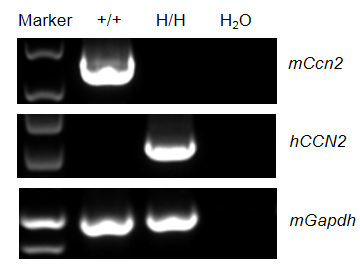
Species specific analysis of CCN2 gene expression in wild-type C57BL/6 mice and homozygous humanized B-hCCN2 mice plus by RT-PCR. Lung RNA was collected from wild-type C57BL/6 mice (+/+) and homozygous B-hCCN2 mice plus (H/H). Mouse Ccn2 mRNA was detectable only in wild-type C57BL/6 mice. Human CCN2 mRNA was detectable only in homozygous B-hCCN2 mice plus, but not in wild-type C57BL/6 mice.
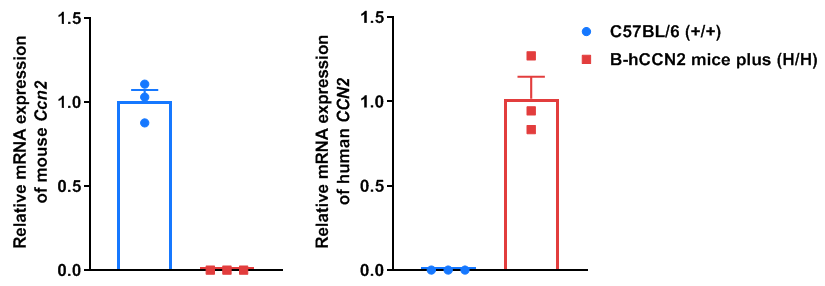
Species specific analysis of CCN2 gene expression in wild-type C57BL/6 mice and homozygous humanized B-hCCN2 mice plus by RT-qPCR. Lung RNA was collected from wild-type C57BL/6 mice (+/+) and homozygous B-hCCN2 mice plus (H/H) (male, 7-week-old, n=3). Mouse Ccn2 mRNA was detectable only in wild-type C57BL/6 mice. Human CCN2 mRNA was detectable only in homozygous B-hCCN2 mice plus, but not in wild-type C57BL/6 mice. Values are expressed as mean ± SEM.
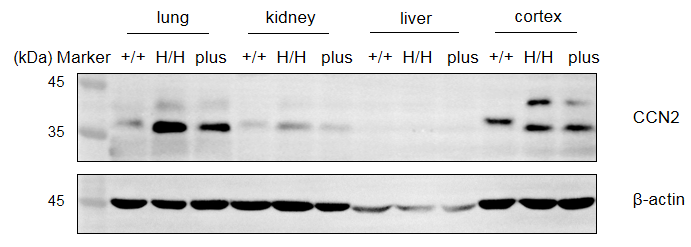
Western blot analysis of CCN2 protein expression in homozygous B-hCCN2 mice and B-hCCN2 mice plus. Various tissue lysates were collected from wild-type C57BL/6 mice (+/+) and homozygous B-hCCN2 mice (H/H) and homozygous B-hCCN2 mice plus (plus), and then analyzed by western blot with anti-CCN2 antibody (abcam, ab209780). 40 μg total proteins were loaded for western blotting analysis. CCN2 was detected in lung, kidney and cortex of wild-type mice and homozygous B-hCCN2 mice and B-hCCN2 mice plus, as the antibody is cross-recognize both human and mouse CCN2.
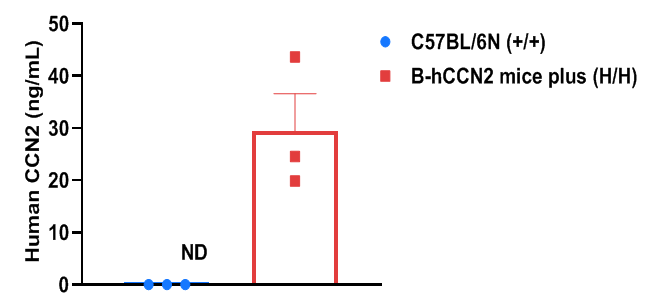
Strain specific CCN2 expression analysis in wild-type C57BL/6N mice and homozygous B-hCCN2 mice plus by ELISA. Serum was collected from wild-type C57BL/6N mice (+/+) (female, n=3, 8-week-old) and homozygous B-hCCN2 mice plus (H/H) (female, n=3, 8-week-old). Expression level of human CCN2 were analyzed by ELISA (anti-human CTGF ELISA kit: abcam, ab261851). Human CCN2 was exclusively detectable in homozygous B-hCCN2 mice plus.




